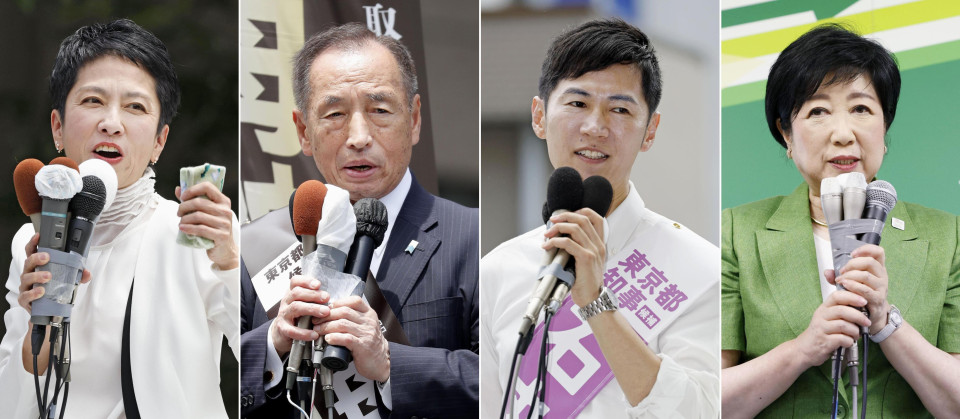Tokyo Gov. Yuriko Koike is leading the polls by a small margin in the Tokyo gubernatorial election that will take place on July 7, a Kyodo News survey showed Sunday.
The incumbent 71-year-old Koike, who is seeking to secure her third four-year term, is effectively backed by the ruling bloc. She is closely followed by key challenger Renho, 56, a former upper house lawmaker supported by the main opposition.
Among other candidates, Shinji Ishimaru, the 41-year-old former mayor of Akitakata in Hiroshima Prefecture, western Japan, has seen a strong surge in support, while former Air Self-Defense Force chief Toshio Tamogami, 75, has not gained much ground.
Over 10 percent of voters have yet to decide on who they will be voting for, the survey showed.

Kyodo's figure was based on a telephone survey of eligible voters in Tokyo as well as other data and analysis from other sources.
The telephone survey was conducted over two days from Saturday, yielding 523 valid responses from landlines and 515 from mobile phone users.
The latest election is seen as a proxy war between national parties, with the ruling bloc comprising the Liberal Democratic Party and its junior coalition Komeito party supporting Koike, and the Constitutional Democratic Party of Japan, along with the Japanese Communist Party and the Social Democratic Party, backing Renho.
By political party, over 50 percent of LDP supporters and around 70 percent of Komeito supporters in the telephone survey have indicated they will vote for Koike. Renho, meanwhile, has garnered support from 70 percent of the backers of the CDPJ, and around 80 percent of those of the JCP.
Among supporters of the Japan Innovation Party, which has decided not to field its own candidate, over 40 percent favored Ishimaru while around 30 percent leaned toward Koike.
Non-aligned voters largely supported Koike at just under 30 percent, while Ishimaru and Renho each received backing from around 20 percent.
Asked what the top policy priority is for the capital, 22.7 percent of survey respondents said medical care and other welfare, followed by 22.4 percent with economy and employment and 20.3 percent with education and child care.
Related coverage:
FOCUS: Tokyo's July governor election akin to Japan's "presidential race"
FOCUS: Koike-Renho leadership contest to have ramifications far beyond Tokyo
Poster pranks cause chaos in Tokyo gubernatorial election campaign










